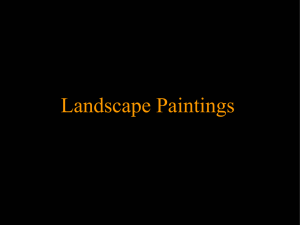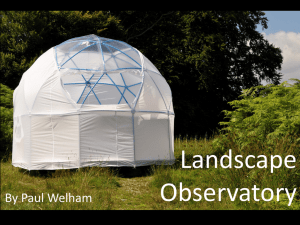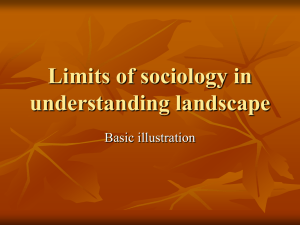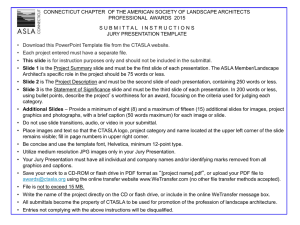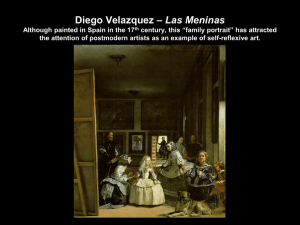Landscape Ecology
advertisement
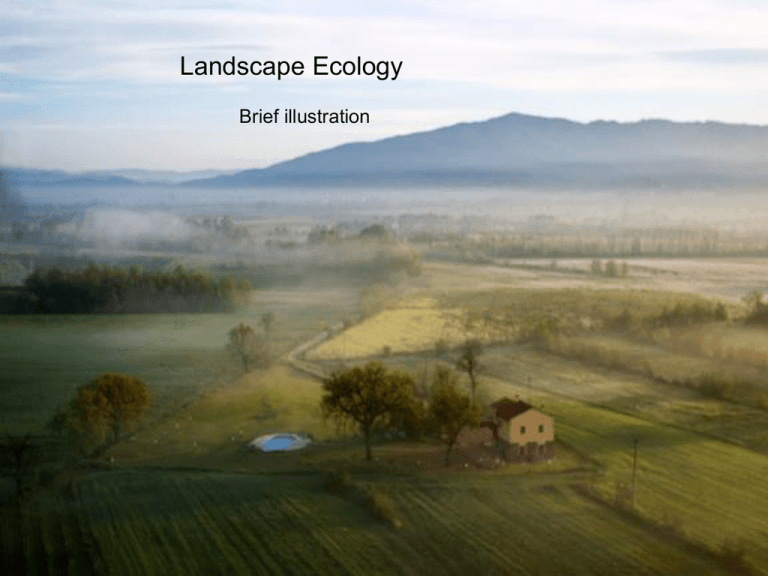
Landscape Ecology Brief illustration Landscape Ecology: History Milan Ruzicka 1975 IALE Czechoslovakia Landscape Ecology has been energized by key contributions from landscape architects, foresters, planners, geographers, artists, environmentalists, philosophers… Inclusive rather than Exclusive Landscape ecology: what is it? Landscape ecology is the study of spatial variation in landscapes at a variety of scales. It includes the biophysical and societal causes and consequences of landscape heterogeneity. Above all, it is broadly interdisciplinary. The conceptual and theoretical core of landscape ecology links natural sciences with related human disciplines. On the official website of IALE, 2011 http://www.landscape-ecology.org/ „Geography“ period Where it is? What this is? Look on the landscape at a time in great scale Carl Troll, 1936, using air/born photo of landscape LANDEP, Ruzicka, 1980, tools for landscape planing „THE“ period Zev Naveh, Isaak Zoneveld 1975 .....1980, 1990 geography, humanity explicity ecumenical „Do not draw boundaries around the field too soon. Welcome to use the insight of all relaled fields that chaose to build liknages“ Integration, THE, intedisciplinarity... • Bridge between science and humanities (Zev Naveh) Spatial period Forman R.T.T. and Godron, M. 1986. Landscape Ecology. Mosaic patterns, process and change Patch – corridor – matrix model LE offers methodologically opportunities for reserch and theory LE spatially integrating people and nature Balance between land-use and human culture „Out of human system“ period J.I. Nassauer, R. G. H. Bunce, 1990 Spatial details Models Landscape sociology period? Advanced illustration Shift towards landscape (and) sociology? Landscape ecology • • • • • • Tools for better landscape planning Balance between land-use and human culture Filling societal demands Societal demands ….carrying capacity Landscape as narrative system Landscape as valuable system itself …landscape (and) sociology? Spatial problems of landscape – no human phenomenon Human as the other ecological factor – external effect Human as demands system, aim, strategy – planning Human as a system itself, culture, perception, values – very rare in landscape ecology Integration, THE, intedisciplinarity... Proclamations and facts • Bridge between science and humanities (Zev Naveh) Our Research: Metodology Content analyses 1999-2008 leading LE journals Landscape Ecology: Landscape Ecology Landscape and Urban Planning Ekológia (Bratislava). LE 708 LUP 930 Ekológia 890 Total 2528 no articles, proceeding papers, review articles yes editorials, introductions, prefaces, perspectives, comments, replies Metodology We reviewed 2528 abstracts of scientific articles in LE and LUP journals. This number means all articles from the decade available through Web of Science (LE) and Science Direct (LUP). Articles were divided into 3 groups/categories according to the position of human system (Social, Natural & Technical management). All abstracts were read, not just checked according to keywords. In Social group all full version of articles were reviewed. Categories Social NT management human system is an object of research for human, but human system is not research object Natural human system is not an object of reserach Results Landscape Ecology 100% 90% 80% 70% 60% 50% 40% 30% 20% 10% 0% přírodní technické sociální 1999 2000 2001 2002 2003 2004 2005 2006 2007 2008 Landscape Ecology Natural 83% Social 5% NT mngmt 12% Results Landscape and Urban Planning 100% 80% přírodní 60% technické 40% sociální 20% 0% 1999 2000 2001 2002 2003 2004 2005 2006 2007 2008 Landscape and Urban Planning Natural 33% Social 37% NT mngmt 30% Results Ekológia 100% 80% přírodní 60% technické 40% sociální 20% 0% 1999 2000 2001 2002 2003 2004 2005 2006 2007 2008 Ekológia 8% 12% 80% Results (%) LE LUP Ekológia Social 5,5 36,2 8,4 NT mngm 11,9 30,3 11,5 Natural 82,6 33,4 80,1 LE LUP Ekológia Discussion and conclusion • While some other studies and reviews are focused on more criterias, i.e. Wiens (1992), Hobbs (1997) and Andersen (2008), we focused mainly on social system in landscape as primary research object, which requires connection with social sciences. From this point of view we can note that LUP has evidently better proportional concern on social aspects of landscape than LE, even higher than Antrop’s study shows (2001). Landscape Ecology, the house journal of IALE, doesn’t meet its proclamated role to be the bridge between nature and culture, between science and humanities. Analysis of our total sample of abstracts and articles shows Andersen’s (2008) conclusion about articles focusing on sociology in LE like overemphasized, maybe due to random sampling of 50 cases and classification of papers belonging to Social system following her very broad definition as „some aspect of sociology“. • Results show that the real cooperation with social sciences (Golley, 1996), integrating humans into landscape ecology (Wu and Hobbs, 2002) and concept of Total Human Ecosystem (Naveh, 2000) are more proclamations and wishes than a real way of thinking among the group of landscape ecologists presenting their papers in the elite house journal of IALE. It looks like reductionism towards landscape science bears fruit. • Isn´t it the right time for return to landscape ecology? Conclusion I patterns patterns pattern s scale process process changes patterns – process - changes disturbances disturbances Conclusion II Have humanities something valuable to offer to natural sciences? • Isn’t landscape too cultural construct? • Reduction of landscape to too scientific term without any cultural context. Ecological reality Social construction Next presentation: Landscape as nature - culture continuum Sociological perspectives or Final essay concerns the possible future development of Landscape Sociology or Landscape Studies in general

